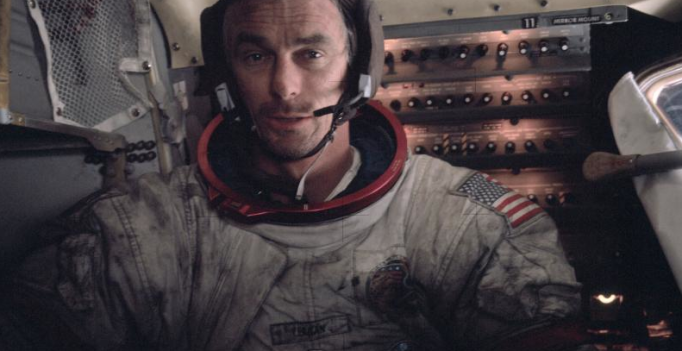Based on an autobiography of the same name, Mark Craig’s The Last Man on the Moon documents the experiences and recollections of retired US naval pilot and NASA astronaut Eugene Cernan who, in addition to a couple of other trips to space, was commander of the 1972 Apollo 17 lunar landing. As the last one of his mission to re-enter the vessel, Cernan remains – to this day – the last human being to have set foot on the surface of the moon.
While Cernan’s accomplishments are certainly incredible, his ability to articulate his experiences and impressions of both the lunar surface and the inner workings of NASA during the height of the “Space Race” is also formidable. While walking on his ranch in Texas and strolling through the almost post-apocalyptic landscape of abandoned NASA launch sites, Cernan’s voice is choked with emotion as he recounts his first moments on the surface of the moon. “I look up there [at the moon] and I let myself reflect for just half a minute or so,” he says early in the film. “I can take myself there at the speed of thought.”
The film’s greatest strength is its ability to juxtapose Cernan’s intimate first-hand account of his time as an astronaut with historical news footage of the launch of the Apollo missions, President Kennedy, the training of the Apollo astronauts, and interviews with members of the ground control crew, Cernan’s ex-wife, as well as old friends from his early days in the Navy. The result is not only a nuanced portrait of Cernan himself, but a larger picture of the space program of the 1960’s and early 70’s that refuses to leave out the intense impact the program had on the astronaut’s wives, children, and safety (the film includes footage of the 1966 NASA T-38 crash as well an interview with the wife of one of the crew killed in the Apollo 1 fire).
As retired flight director Gene Kranz states during an interview filmed at the actual Mission Control desk where he worked in 1972, “risk is the price of progress.” The personal sacrifices that were made for the sake of the American space program are almost as central to the film as Cernan’s own memories are. The Last Man on the Moon is an eloquent and thoughtful snapshot of a period in American history that is too often romanticized. While the film doesn’t shy away from acknowledging the impressive scope of Cernan’s achievements, it never indulges too much in celebrating the ways that its subject might be perceived as an inspiration to others. The style of the cinematography is simple and unassuming, much like Cernan himself, but the film’s capacity to pack a huge emotional punch should not be underestimated.
**********
Do You Tweet? Follow These Tweeple:
Shannon Page: @ShannonEvePage





Leave a comment